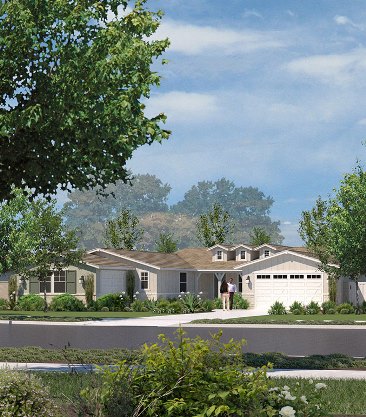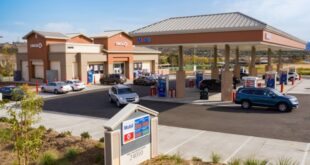Despite a severe housing shortage, the Chino city council said no to Chino Francis Estates, leaving the project’s developer to explore their options.
Chino Francis Estates seemed like the ideal housing development for a city in need of more housing. According to the Southern California Association of Governments, Chino needs to build approximately 6,500 housing units in the next eight years to meet the minimum housing construction requirements assigned to it by the State, or risk having to pay severe fines.
Developer Borstein Enterprises proposed building 39 single-family detached homes on 13.3 acres with average lot sizes of 10,100 square feet within the unincorporated sphere of influence of Chino at the southwest corner of Francis and Yorba avenues. The project would have to be annexed into the City following City Council’s approval of the proposed general plan amendment.
Adjacent neighbors on La Causey Court have complained for over a decade about the blighted property and supported the project after the developer scaled back the density from 47 units and changed the architecture to include all single story homes. The proposed project included significant upgrades to local infrastructure including adding sidewalks, streetlights, accessibility ramps and upgrading of utility lines in an area lacking services commonly available in southern Chino.
Loren Borstein, President of the Los Angeles based company stated, “We spent three years working with the neighborhood, planning department, and other city departments, to create a project which garnered over 650 local supporters, and we did an unprecedented amount of outreach.”
In December, following a spirited public hearing, the planning commission voted 4-3 in favor of the project, approving the tentative map and finding in ordinance 2020-001 that “the proposed pre-zoning is consistent with the goals and policies of the Chino general plan as the Land Use Element of the general plan includes objective LU1.1 identifying the need to provide a variety of housing types that meet the housing needs of residents of all income levels in the City.” Further the commission report stated “in the case of the pre-zone for this property, the change will not impact the harmonious relationship with adjacent parcels and land uses as the surrounding properties are developed with a range of single family uses that are consistent with the proposed RD4.5”
Often a city’s planning commission’s vote is the final word, but since an annexation and general plan amendment was needed, the City Council took Chino Francis Estates under consideration and voted 3-2 against the project in a packed house with more residents speaking in favor of the project than against.
“It’s a beautiful project,” said Mayor Eunice M. Ulloa, who voted against the project along with council members Mark Hargrove and Marc Lucio. “I would vote for it, but there are some issues that I think should be taken care of before I can vote for something like that.”
Ulloa said she wants the city to resolve issues regarding its sphere of influence, and whether the entire area should be master planned and annexed at once rather than project by project. However Ulloa stated at the council hearing that “The neighbors to the north are not going to develop for many, many years, if ever.”
When asked about this, Borstein agreed and said, “Waiting for a master plan and unanimous consent to annexation is not a realistic alternative for Chino to fulfill its housing needs in this RHNA cycle and potentially decades into the future and once accomplished would require increased density to result in a positive fiscal impact to the city.”
According to Roger Dale of The Natelson Dale Group, an economic and financial consulting firm that reviewed the city’s SOI fiscal impact report and spoke at the hearing on behalf of the project said the study forecasts that any scenario involving annexation of the entire SOI would result in negative fiscal impacts for many years to come. Under the worst-case scenario, where the entire SOI area is annexed under current General Plan land uses, dominated by RD2 zoning, the City would not break even on annexation until the year 2070.
In contrast, Dale says “Out of the three major ways that the City could approach annexation of the SOI, the “Status Quo” option was by far the best from a fiscal perspective. The Status Quo approach is the process the City currently has, which is to consider individual annexation requests in response to specific development proposals.”
According to Dale, the SOI study supports the conclusion that the Chino Francis Estates project would have a positive fiscal impact on the City.
Councilman Paul Rodriguez, who along with Councilman Tom Haughey voted in favor of the project stated, “We have a large sphere of influence, a lot larger than most cities, and if we try to annex all of that at once, which some people want to do, we’ll go broke.”
Chino still has a slow-growth strain that dates to its days as a dairy farming community, according to Rodriguez. “In today’s world, this is not a dense project,” he said. “Thirty nine homes on 13 acres is not high density. Two houses per acre is “Leave It to Beaver” stuff. It’s from a different era.”
Ulloa, at the hearing also stated that “There are still too many things that need to be worked out. There are septic tanks on that property, and it’s not clear whether we can build anything on top of them. There are questions about flood control, and who in general should provide services there. As soon as we annex anything, all of those issues become something the city has to deal with.”
However, according to Borstein, the City Civil Engineering Manager answered questions at both the planning commission and city council hearing regarding local drainage issues and confirmed that the proposed project would not change existing drainage patterns and is designed to reduce drainage off the site by 20 percent from its existing condition.
Further, Borstein said “there are only two septic tanks on the property and its commonplace to remove septic tanks prior to development of any project.”
When asked if he was surprised by the council’s decision, Borstein stated “We made nearly every concession that the neighborhood and staff requested and as a result had widespread community support for a 100% single story project on large lots that conformed with the goals and policies of the city’s general plan. These goals and policies are intended to guide land use decisions as times change and is unfortunate that those resistant to change deprived the city of a very good project that would have transformed an area of the city that has been left behind.”
Carlos Rodriguez, chief executive officer of the Building Industry Association’s Baldy View Chapter, which represents homebuilders in San Bernardino County agreed. The Chino City Council did a “disservice” to working families that wish to buy a home in Chino when it turned down Chino Francis Estates.
“The good faith efforts by Borstein Enterprises to make extensive changes to accommodate the wishes of the City and local residents resulted in support by the planning commission, so it’s hard to fathom why the mayor and two council members would display such animosity toward quality housing,” Carlos Rodriguez said in a statement. “That this decision happened in the face of a historic housing crisis in California is unconscionable, and it underscores why Chino continues to fail to meet their state-required housing obligations.”
“Chino Francis Estates is a great project that would enhance the city in terms of quality housing and economic impact.”
Since taking office in January of last year, Gov. Gavin Newsom has signed at least 18 bills designed to make it easier for homebuilders to get projects approved and completed, and he’s set a goal of building 3.5 million homes by 2025, or 500,000 a year.
Meanwhile, what Chino will do about its share of the state’s housing crisis remains to be seen, but Borstein indicated he can’t afford to wait years to find out.
 IE Business Daily Business news for the Inland Empire.
IE Business Daily Business news for the Inland Empire.


